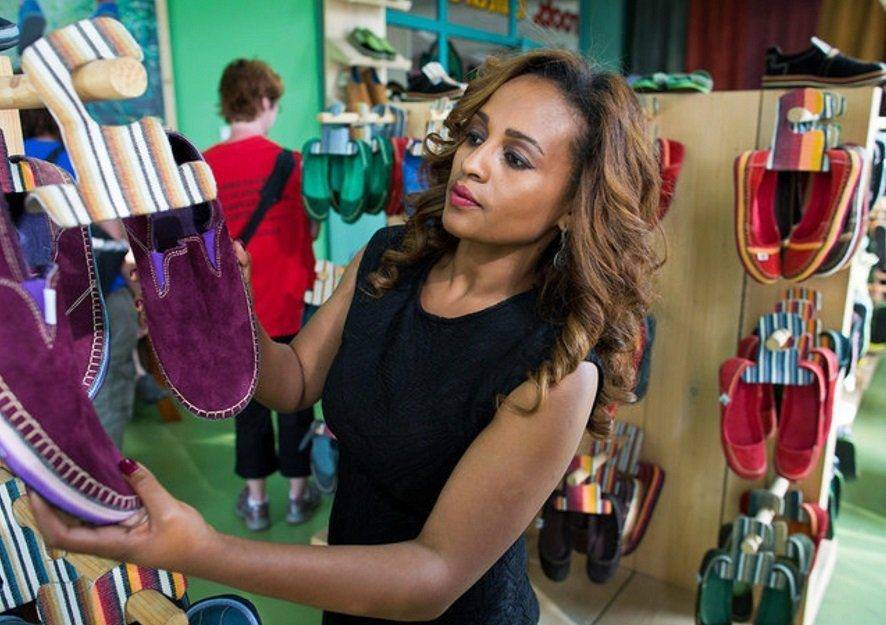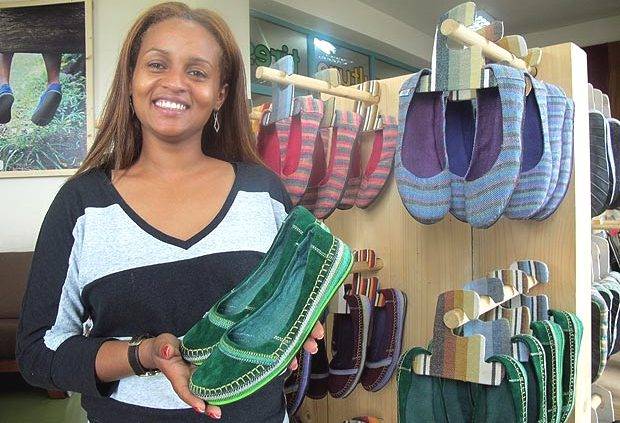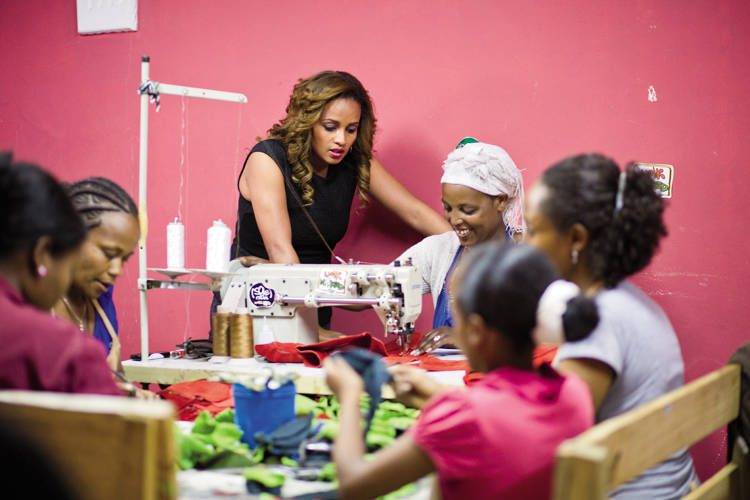She Business
Naom Monari’s App Disrupts Elderly Home Care in Kenya
Bena Care is bridging this gap by providing supportive and clinical care to chronically ill patients in low-income areas. The main focus is rural Kenya, where a family member may require long-term care, necessitating another family member to step up and play a caregiving role

By Charles Wachira,
Naom Monari, 30, is the founder of Bena Care Ltd., an award winning social enterprise located in Kenya that provides clinical and physiotherapy care services to patients inflicted by life threatening illnesses from the comfort of their homes.With the clients , disproportionately drawn from the country’s elderly caste.
The eureka moment leading Naom to think of starting the social care service happened while she was working as a nurse student at Gatundu Level 5 Hospital, based in central Kenya in 2016.
Then she realised the medical facility was facing challenges of bed availability and the situation was further exacerbated by patients receiving non-urgent medical care but were occupying beds.
“ Imagine some of the patients in the wards were simply receiving mundane but necessary services such as wound dressing , bathing or simply taking drugs to manage a condition.While others who were facing life threatening infections had been abandoned and were in limbo, with no bed, apparently available for them,” says Naom.
One day while she was doing her routine rounds in a ward she came across a patient who had a diabetic infected foot and who happened to have hogged a lot of time on a hospital bed.
She approached his son, who happened to be registered at the hospital as his nearest of kin and made a proposal to him.
“ I can take care of your father while he’s home based but at a fee,” he told the son.
The rest, as they say is history, for the idea turned to be seminal as word got round that patients suffering from non-life threatening diseases could receive compassionate,reliable, clinical and supportive care from the comfort of their homes.
And in 2017 , she officially registered BENA Care Limited , with the brand name coined from her now eight year old daughters’ name Beata and hers, Naom.
The Organisation, which has a tagline that reads ‘Healthcare at Your Doorstep’ has to date attended to an estimated 6000 patients who are also offered the opportunity of purchasing homecare equipment on the cheap, for in essence in many instances they re-purchase the medical contraptions from former users but with a caveat that the equipment has been well-maintained.
It’s standard practice for the care-giver to sign contracts with clients, that guarantees the nurses are licensed and possess a certificate of good conduct , provided by the local police constabulary. There is also an indemnity insurance cover signed , in the event, a nurse misconducts themselves.
“So as to protect our nurses , we insist that they document everything they do while attending to a patient , so that in the event of a court case cropping up the organisation has something tangible to fall back to as a defence,” says Naom.
Fatima Ali Omar, 69, had been in and out of hospital since early 2021.She was admitted at a local private hospital here in Nairobi , “ while she was very sick from a lung infection” says Lucky Omar, 40, her daughter.
“ But I could tell that she was not receiving the full attention that she was requiring and I was getting frustrated.Someday while I was in the hospital, I googled for home care hospital services that were located within Nairobi.And I got several organisations but in the end I was convinced Beta Care had what , as a family we were searching for,” says Lucky, who is a business lady based in Eastleigh,located East of the Nairobi’s Central Business District (CBD),which happens to be one of Africa’s biggest retails markets that hosts, the Business Bay Square Mall, boasting 130,000 square metres , making it the largest mall within the East African region..
“ BETA Care provides live-in carers who are constantly monitoring the progress of a patient.They create an enabling environment that allows members of a family to pursue their day-to day pursuits with having anxiety their patient is receiving perfunctory service.They also provide one aspect that a lot of caretaking organisations lack, namely dignity for a patient, for the ailing have to be bathed , taken to the washroom and so on.And the BETA care nurses provide these delicate services diligently,”says Lucky, who unfortunately is still mourning her mother who died mid this May after being under the watch of BETA Care nurses for one and a half years.
Enter Ali Omar, 72.
He was afflicted by a stroke in 2020.And in his daughter’s telling , Ali went on to suffer a spinal injury which deteriorated with time as he ostensibly recuperated at a local hospital here in Nairobi and the hospital fee skyrocketed to Ksh 2 million (US $ 14,430) in today’s exchange rate.
“ As a family we were stressed , that was a lot of money, yet dad’s was not getting any better.That is when somebody told us about BETA care, and we gave the organisation a try.And, honestly , the services are fantastic, dad has since become much better , for he can digest food now, as opposed to the past, when he could not and the cost has been halved,” says Fatima Ali Omar , 28, the daughter.
Mr Ali Omar, 72.
If you google to find out how many home care based medical facilities exist in Nairobi alone, one will discover they are a multitude.
Kenya, happens to be a lower middle income country, with an estimated population of 52 million people. In 2022, 17 percent – that is over 8.9 million people – were living under extreme poverty, mostly in rural areas, according to Statista, an online portal providing data on the global digital economy, industrial sectors, consumer markets, public opinion, media and macroeconomic developments.
The portal further shows that an estimated 7.8 million Kenyans in rural enclaves lived on less than $1.90 ( Ksh 263 ) daily, a figure that was 6.5 times higher than that recorded in urban regions.However, the poverty incidence had since declined compared to 2020.
Says Naom, “ Bena Care is bridging this gap by providing supportive and clinical care to chronically ill patients in the low income areas.With the main focus being rural Kenya, where a family member may be in need of long term care , necessitating another family member to step up and to play a caregiving role.”
Kenya’s healthcare delivery system is pluralistic with a 50%-50% split between public and private healthcare providers, who are organised into four tiers, namely community, primary care, county referral and national referral hospitals.
“ We have improved our efficiencies by setting up a healthcare technology app @ benacare, which is a digital platform that geomaps nurses and physiotherapists drawn from across the country, who then take care of patients from the comfort of their homes,” says Naom who bootstrapped the idea of setting up BENA Care to fruition .
The Online platform also links families in need of homecare appliances to families possessing used equipment.
“ We are planning to replicate this model we are using here in Kenya to other African countries in future.But for now we have a lot of territory to cover here in Kenya for our nurses are found in seven out of the 47 counties found in Kenya,” says Naom who was the winner of the Waislitz Global Citizen Disruptor Award, a $50,000 prize given to an applicant who has created measurable impact in an innovative way that disrupts the existing systems that allow for extreme poverty to persist in 2024
Keywords:Bena Care Ltd Kenya:Home healthcare services Nairobi:Naom Monari founder:Physiotherapy and clinical care Kenya:Waislitz Global Citizen Disruptor Award 2022
She Business
Bethlehem Tilahun Alemu: From Ethiopian Artisan to Global Icon

: Discover how Bethlehem Tilahun Alemu built SoleRebels into a global,
sustainable footwear brand, overcoming challenges and transforming Ethiopian
craftsmanship.
Bethlehem Tilahun Alemu’s story begins in Zenabwork, a modest village on the outskirts
of Addis Ababa, Ethiopia. Growing up, she watched her community struggle with unemployment and poverty, despite a rich heritage of artisanal skills that remained largely untapped.

Fueled by determination and a desire to transform her surroundings, Bethlehem
embarked on a journey that would redefine African entrepreneurship and put Ethiopia
on the global map.
Her creation, SoleRebels, isn’t just a footwear brand. It’s a movement—an embodiment
of sustainability, culture, and empowerment.
A DREAM WOVEN WITH TRADITION
In 2005, Bethlehem founded SoleRebels with a simple yet powerful idea: to turn
Ethiopia’s rich artisanal craftsmanship into eco-friendly, globally competitive footwear.
Inspired by traditional “selate” shoes—made from recycled tyres—she envisioned a
brand that blended cultural authenticity with modern design.
She recruited local artisans, many of whom were unemployed, and encouraged them to
innovate while preserving traditional techniques.
Every pair of shoes was a masterpiece, crafted from hand-spun cotton, organic
materials, and repurposed car tyres. Bethlehem’s concept was groundbreaking: a product that told a story while making a global impact.
STARTING FROM SCRATCH
Like many entrepreneurs, Bethlehem’s initial challenge was capital.
With no access to bank loans or large investors, she relied on personal savings and
modest contributions from her family.
Slowly but surely, she built her business, reinvesting profits into training workers and
improving production tools. International grants and initiatives like the SEED Initiative later recognized the potential of her venture, providing additional support.

The early days weren’t easy. Artisans lacked modern tools, and accessing raw
materials was an uphill battle. But Bethlehem, known for her tenacity, tackled these challenges head-on. She developed partnerships with local suppliers to ensure a consistent supply of quality materials and invested in upskilling her workforce.
Breaking into the global market presented another hurdle. Competing against established brands seemed daunting, but Bethlehem found her edge: sustainability and ethical production.
In an era when consumers were becoming eco-conscious, SoleRebels’ ethos of fair wages, recycled materials, and cultural storytelling resonated deeply.
BUILDING A GLOBAL EMPIRE
Fast forward to today, and SoleRebels has a presence in over 30 countries, with
flagship stores in cities like San Francisco, Tokyo, and Barcelona.
It is also the first African footwear brand to be certified by the World Fair Trade
Organization (WFTO)—a testament to Bethlehem’s commitment to doing business the
right way.
Her company directly and indirectly employs over 1,200 people, making it one of
Ethiopia’s largest employers in the artisan sector.
Workers earn more than three times the industry average, a policy Bethlehem takes
immense pride in. “When we pay people well, we don’t just change lives—we transform
communities,” she says.

MENTORS AND INSPIRATIONS
Bethlehem often credits her late grandfather, a farmer and community leader, as her
greatest mentor.
His work ethic and deep belief in the power of local communities shaped her vision. She
also draws inspiration from global leaders, including Ethiopian Prime Minister Abiy
Ahmed, whose focus on innovation and economic growth aligns with her goals.
RISING ABOVE CHALLENGES
Bethlehem’s entrepreneurial journey has been marked by resilience. When production
scaled up, she faced supply chain disruptions that threatened deadlines. Her solution?
Cultivate long-term relationships with reliable local suppliers and diversify material
sources.
Entering new markets came with its own set of obstacles. Competing against
established brands requires a unique value proposition.

SoleRebels offered more than shoes—it offered a story: a product steeped in Ethiopian
culture, made sustainably, and crafted ethically.
VISION FOR THE FUTURE
Bethlehem isn’t slowing down. Her plans include:
- ● Expanding SoleRebels’ retail presence in Europe and Asia.
- ● Introducing sustainable clothing lines.
- ● Partnering with global brands to promote eco-friendly production in Africa.
Beyond SoleRebels, Bethlehem has a broader mission: to inspire a new narrative for
African entrepreneurship. She wants to show the world that Africa isn’t just a consumer
market but a hub for innovation and excellence.
CONCLUSION: WALKING THE TALK
Bethlehem Tilahun Alemu has redefined what it means to be an entrepreneur. From
Zenabwork’s dirt roads to the global stage, she has shown that success doesn’t come
from resources alone—it comes from vision, grit, and a deep connection to one’s roots.
With SoleRebels, Bethlehem has not only created a thriving business but a model for
how sustainable, ethical enterprises can transform communities. As she continues to
dream big, her footsteps pave the way for the next generation of African changemakers.
She Business
Joyce Akinyi Convicted: Heroin Smuggling Case Exposed

: Kenyan businesswoman Joyce Akinyi faces life imprisonment after being found
guilty of smuggling heroin worth US$ 34,483. Her history with crime has now
unravelled.
Joyce Teresia Akinyi’s story is one of dramatic highs and lows—rising from a successful
businesswoman to being convicted of a large-scale heroin smuggling operation.
With ties to international criminal networks, high-profile relationships, and repeated run-
ins with the law, Akinyi’s life has been marked by controversy and legal battles.
THE HIGH LIFE: BUSINESS AND INFLUENCE
Akinyi first gained prominence as the upscale Deep West Resort owner in Lang’ata,
Nairobi. Known for her affluent lifestyle, she mingled with Kenya’s elite and maintained
significant business interests.
However, behind the glamorous facade lay a darker world of alleged criminal activity.
Her personal life was equally turbulent. In 1998, she met Nigerian businessman Anthony Chinedu, and the couple had two children before formalising their union.

Their relationship was rocky, marked by numerous arrests on drug trafficking charges.
In 2013, Chinedu was deported from Kenya after authorities seized drugs in his
possession, a move that further exposed Akinyi to public scrutiny.
A HISTORY OF LEGAL TROUBLES
Over the years, Akinyi faced repeated allegations of drug trafficking. Her name became
prominent in 2008 when she was arrested in New Delhi, India, alongside former
Budalang’i MP Raphael Wanjala.
Authorities detained the pair with undeclared cash worth Sh7.59 million, suspected to
be linked to drug deals. Although released after intervention by the Kenyan government, the incident marked the start of a string of legal troubles for Akinyi.
In 2013, she and Wanjala were arrested again on the Nairobi-Namanga highway with a
suspicious white powder. Although they claimed it was corn flour, suspicions persisted,
and Akinyi’s criminal associations deepened.
THE TURNING POINT: CONVICTION FOR HERION SMUGGLING
Akinyi’s criminal activities reached a dramatic conclusion in 2019 when a police raid on
Deep West Resort uncovered 2kg of heroin worth Sh5 million hidden in a shoe rack.
The Anti-Narcotics Directorate linked the operation to an international smuggling
network coordinated by Akinyi.
The Jomo Kenyatta International Airport Tribunal found Akinyi guilty under Article
4(a) of the Narcotic Drugs and Psychotropic Substances Control Act, which
mandates life imprisonment for drug trafficking.
The court heard compelling evidence, including photographs of heroin wrapped in white
tape, voice recordings coordinating smuggling activities, and the discovery of a Tabita
Digital Scale used to weigh drugs.
Akinyi’s co-defendants, Paulin Kalala Musankinshay and Peres Adhiambo, were
similarly implicated. Evidence also revealed that Akinyi used multiple fake passports, including a Congolese passport in the names of “Mape Marline Kambura” and “Raha Eveline
Kambere,” enabling her to operate under different aliases.
FINANCIAL CRIMES AND ASSET RECOVERY
Beyond drug trafficking, Akinyi’s wealth came under scrutiny. In 2021, she lost two
luxury vehicles worth Sh20 million to the State, deemed proceeds of crime.
Investigations by the Asset Recovery Agency revealed that Akinyi deposited
suspiciously large sums ranging from Sh60,000 to Sh20 million into various bank
accounts. Her real estate investments—villas built and rented out—further indicated
illicit income sources.
THE END OF THE ROAD
On December 10, 2024, Akinyi faces sentencing, which could include life
imprisonment and a Sh5 million fine. Her fall from grace highlights the dangers of
unchecked ambition and illegal pursuits. Magistrate Njeri Thuku, who presided over the
case, dismissed Akinyi’s defence that the drugs were planted by her estranged husband
Chinedu, calling it baseless.
CONCLUSION
From her meteoric rise as a business mogul to her conviction as a drug trafficker, Joyce
Akinyi’s life is a cautionary tale of how power, wealth, and crime can intertwine.
Her story also underscores Kenya’s ongoing battle with drug trafficking and the far-reaching
consequences of organised crime. For Akinyi, the glitz and glamour of her former life
have now given way to the stark reality of justice.
Nb: Exchange rate 1 USD = 145 Ksh
She Business
How Margaret Nyamumbo Built Kahawa 1893 from the Ground Up

: Discover Margaret Nyamumbo’s journey from Kenya to the U.S. and how she
built Kahawa 1893 to empower women coffee farmers, achieving business
success and social impact
Early Life and Education: Pursuing Global Opportunities
Margaret Nyamumbo’s entrepreneurial journey began in Kenya, where she grew up on a coffee
farm. However, she moved to the U.S., a decision that significantly shaped her path.
In 2000, she travelled to Smith College, a prestigious liberal arts institution in Massachusetts,
to study economics.
Her desire to study abroad stemmed from the limited educational opportunities available for
women in Kenya at the time. As she later explained, her family encouraged her decision, viewing it as a way to give her the best opportunities for success.

After earning her degree from Smith College, Nyamumbo pursued an MBA at the Wharton
School of the University of Pennsylvania, known for its rigorous business programs.
This solidified her foundation for a future in business, although it was the allure of her roots and a passion for coffee that eventually led her back to entrepreneurship.
From Corporate Work to Entrepreneurship: Embracing Coffee Culture
After completing her studies, Nyamumbo worked in investment banking and consulting, but the world of corporate finance didn’t fully satisfy her ambitions.
It was her return to the coffee industry, deeply connected to her Kenyan heritage, that drove
her entrepreneurial leap. With a vision to support East African coffee farmers, particularly women, Nyamumbo founded Kahawa 1893 in 2018, a coffee brand dedicated to highlighting Kenya’s coffee culture while mpowering local farmers.
The name “Kahawa” is the Swahili word for coffee, while “1893” marks the year when coffee
was first commercially grown in Kenya, grounding her brand in historical significance.
Through Kahawa 1893, Nyamumbo aimed to bring a new approach to the coffee business, one
that not only celebrated East African coffee but also created fair wages for farmers.
Building a Brand with Purpose: Empowering Farmers
Nyamumbo’s vision for Kahawa 1893 went beyond just selling coffee.
She wanted to create a direct impact on the lives of the farmers growing the coffee beans.
The brand’s model incorporated a system where customers could tip the farmers directly via a
QR code found on the coffee bags.
This innovation set the company apart from competitors and positioned it as a socially
responsible business that directly benefited those involved in the production process.
In 2021, Kahawa 1893 hit a major milestone, getting its coffee stocked in Trader Joe’s—the
first Black- and woman-owned coffee brand to be featured there.
This breakthrough moment was significant for Nyamumbo, marking the recognition of her hard work and her commitment to uplifting local farmers.
Overcoming Challenges: What It Takes to Succeed
Despite the challenges of entering a highly competitive market, Nyamumbo’s determination
never wavered. In a 2022 interview with Forbes, she shared her thoughts on what it takes to be a successful entrepreneur.
“You have to be able to take the punches and keep moving,” she said. Her advice reflects the
reality of entrepreneurship: persistence, resilience, and a willingness to learn from failure are
crucial for success.
Nyamumbo also emphasised the importance of passion. “You’ve got to love what you do, or you won’t have the energy to push through the tough times,” she said.
These values have guided her journey, driving Kahawa 1893 to not only succeed but also to
change the way the coffee industry operates, particularly about fair trade and community
empowerment.
The Future of Kahawa 1893: Expanding Horizons
With her success on platforms like Shark Tank and continued global distribution, Nyamumbo’s
Kahawa 1893 is poised for growth.

Her brand continues to expand its reach, and the emphasis on ethical sourcing, community
impact, and high-quality coffee will likely remain at the heart of her business model as she looks to further innovate in the global coffee market.
Through Kahawa 1893, Nyamumbo has shown that business success is not just about
profits—it’s about purpose, people, and passion.
-

 Business & Money10 months ago
Business & Money10 months agoEquity Group Announces Kshs 15.1 Billion Dividend Amid Strong Performance
-

 Politics4 months ago
Politics4 months agoFred Okengo Matiang’i vs. President William Ruto: A 2027 Election Showdown
-

 Politics3 months ago
Politics3 months agoIchung’wah Faces Mt. Kenya Backlash Over Gachagua Impeachment Support
-

 Politics6 months ago
Politics6 months agoPresident Ruto’s Bold Cabinet Dismissal Sparks Hope for Change
-

 Politics6 months ago
Politics6 months agoKenya Grapples with Investor Confidence Crisis Amid Tax Protest Fallout
-

 Politics6 months ago
Politics6 months agoPresident Ruto’s Lavish Spending Amid Kenya’s Economic Struggles Sparks Outrage
-

 Business & Money2 months ago
Business & Money2 months agoMeet Kariuki Ngari: Standard Chartered Bank’s new CEO of Africa. What’s Next?
-

 Politics5 months ago
Politics5 months agoJohn Mbadi Takes Over Kenya’s Treasury: Challenges Ahead

















